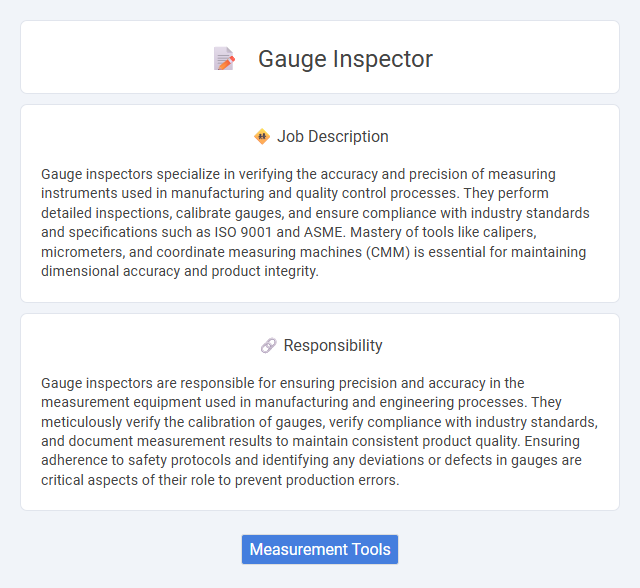
Gauge inspectors specialize in verifying the accuracy and precision of measuring instruments used in manufacturing and quality control processes. They perform detailed inspections, calibrate gauges, and ensure compliance with industry standards and specifications such as ISO 9001 and ASME. Mastery of tools like calipers, micrometers, and coordinate measuring machines (CMM) is essential for maintaining dimensional accuracy and product integrity.
Gauge inspectors often require strong attention to detail and steady hands, which may suit individuals who are precise and patient. Those prone to high stress or discomfort with repetitive tasks might find this role challenging. It is probable that people with good problem-solving skills and the ability to remain focused for extended periods would be better suited to this job.
Qualification
A Gauge Inspector must possess a strong understanding of measurement tools and quality control processes, typically requiring a high school diploma or technical certification in metrology or quality assurance. Proficiency in interpreting engineering drawings and using precision instruments like calipers, micrometers, and coordinate measuring machines (CMM) is essential. Experience in inspection procedures, attention to detail, and knowledge of industry standards such as ISO 9001 or AS9145 enhances job performance and career advancement opportunities.
Responsibility
Gauge inspectors are responsible for ensuring precision and accuracy in the measurement equipment used in manufacturing and engineering processes. They meticulously verify the calibration of gauges, verify compliance with industry standards, and document measurement results to maintain consistent product quality. Ensuring adherence to safety protocols and identifying any deviations or defects in gauges are critical aspects of their role to prevent production errors.
Benefit
Gauge inspector jobs likely offer the benefit of ensuring product quality and safety, which can lead to higher job satisfaction and professional pride. Employees in this role probably experience stable employment due to the consistent demand for quality control in manufacturing industries. The position may also provide opportunities for skill development and career advancement in quality assurance fields.
Challenge
The role of a gauge inspector likely involves significant challenges related to maintaining precise measurement standards and ensuring product quality in highly regulated environments. Stress may arise from the necessity to detect even the smallest deviations that could affect safety or performance, requiring meticulous attention to detail and expertise in specialized equipment. The probability of encountering complex technical issues or tight deadlines suggests a need for strong problem-solving skills and adaptability.
Career Advancement
Gauge inspector roles offer critical experience in quality control and precision measurement, essential for progression into senior inspection or quality assurance positions. Mastery of calibrated measurement tools, understanding of industry standards such as ISO or ASME, and proficiency in data analysis can lead to advanced roles like quality manager or metrology specialist. Consistent performance and certification upgrades enhance prospects for leadership roles in manufacturing or aerospace sectors.
Key Terms
Measurement Tools
Gauge inspectors specialize in using precision measurement tools such as micrometers, calipers, and coordinate measuring machines (CMM) to ensure manufactured parts meet exact specifications. Mastery of these instruments enables accurate verification of dimensions, tolerances, and surface finishes essential for quality control in manufacturing processes. Proficiency in interpreting technical drawings and calibration records supports consistent product compliance and reduces rework costs.
 kuljobs.com
kuljobs.com